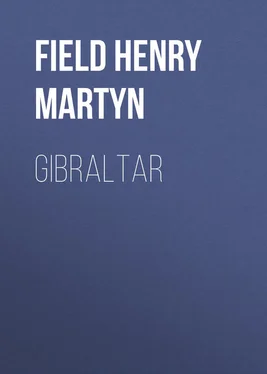Henry Field - Gibraltar
Здесь есть возможность читать онлайн «Henry Field - Gibraltar» — ознакомительный отрывок электронной книги совершенно бесплатно, а после прочтения отрывка купить полную версию. В некоторых случаях можно слушать аудио, скачать через торрент в формате fb2 и присутствует краткое содержание. Жанр: foreign_antique, foreign_prose, на английском языке. Описание произведения, (предисловие) а так же отзывы посетителей доступны на портале библиотеки ЛибКат.
- Название:Gibraltar
- Автор:
- Жанр:
- Год:неизвестен
- ISBN:нет данных
- Рейтинг книги:5 / 5. Голосов: 1
-
Избранное:Добавить в избранное
- Отзывы:
-
Ваша оценка:
- 100
- 1
- 2
- 3
- 4
- 5
Gibraltar: краткое содержание, описание и аннотация
Предлагаем к чтению аннотацию, описание, краткое содержание или предисловие (зависит от того, что написал сам автор книги «Gibraltar»). Если вы не нашли необходимую информацию о книге — напишите в комментариях, мы постараемся отыскать её.
Gibraltar — читать онлайн ознакомительный отрывок
Ниже представлен текст книги, разбитый по страницам. Система сохранения места последней прочитанной страницы, позволяет с удобством читать онлайн бесплатно книгу «Gibraltar», без необходимости каждый раз заново искать на чём Вы остановились. Поставьте закладку, и сможете в любой момент перейти на страницу, на которой закончили чтение.
Интервал:
Закладка:
Of course, in a garrison town the military element is first and foremost. As there are always five or six thousand troops in Gibraltar, it is perhaps the largest garrison in the British dominions, unless the troops in and around London be reckoned as a garrison. But that is rather an army, of which only a small part is in London itself, where a few picked regiments are kept as Household Troops, not only to insure the personal safety of the sovereign, but to keep up the state and dignity of the court; while other regiments are distributed in barracks within easy call in case of need, not for defence against foreign enemies so much as to preserve internal order; to put down riot and insurrection; and thus guard what is not only the capital of Great Britain, but the commercial centre of the world.
Very different from this is a garrison town, where a large body of troops is shut up within the walls of a fortress. Here the military element is so absorbing and controlling, that it dominates the whole life of the place. Everything goes by military rule; even the hours of the day are announced by "gun-fire;" the morning gun gives the exact minute at which the soldiers are to turn out of their beds, and the last evening gun the minute at which they are to "turn in," signals which, though for the soldiers only, the working population of the town find it convenient to adopt; and which outsiders must regard, since at these hours the gates are opened and shut; so that a large part of the non-military part of the population have to "keep step," almost as much as if they were marching in the ranks, since their rising up and their lying down, their goings out and their comings in, are all regulated by the fire of the gun or the blast of the bugle.
The presence of so large a body of troops in Gibraltar gives a constant animation to its streets, which are alive with red-coats and blue-coats, the latter being the uniform of the artillery. This is a great entertainment to an American, to whom such sights in his own country are rare and strange. A few years ago we had enough of them when we had a million of men in arms, and the land was filled with the sound of war. But since the blessed days of peace have come we seldom see a soldier, so that the parades in foreign capitals have all the charm of novelty. In fondness for these I am as much "a boy" as the youngest of my countrymen. Almost every hour a company passes up the street, and never do I hear the "tramp, tramp," keeping time to the fife and drum, that I do not rush to the balcony to see the sight, and hear the sounds which stir even my peaceful breast.
There is nothing that stirs me quite so much as the bugle. Twice a day it startles us with its piercing blast, as it follows instantly the gun-fire at sunrise and sunset. But this does not thrill me as when I hear it blown on some far-off height, and dying away in a valley below, or answered back from a yet more distant point, like a mountain echo. One morning I was taking a walk to Europa Point, and as the path leads upward I came upon several squads of buglers (I counted a dozen men in one of them) practising their "calls." They were stationed at different points on the side of the Rock, so that when one company had given the signal, it was repeated by another from a distance, bugle answering to bugle, precisely like the echoes in the Alps, to which every traveller stops to listen. So here I stopped to listen till the last note had died away in the murmuring sea; and then, as I went on over the hill, kept repeating, as if it were a spell to call them back again:
"Blow, bugles, blow,
Set the wild echoes flying!"
As the English are masters of Gibraltar, I am glad to see that they bring their English ideas and English customs with them. Nothing shows the thoroughly English character of the place more than the perfect quiet of the day of rest. Religious worship seems to be a part of the military discipline. On Sunday morning I heard the familiar sound of music, followed by the soldiers' tramp, and stepping to the balcony again, found a regiment on the march, not to parade but to church . Gibraltar has the honor of being the seat of an English bishop, because of which its modest church bears the stately name of a Cathedral; and here may be seen on a Sunday morning nearly all the officials of the place, from the Governor down; with the officers of the garrison: and probably the soldiers generally follow the example of their officers in attending the service of the Church of England. But they are not compelled to this against their own preferences. The Irish can go to mass, and the Scotch to their simpler worship. In all the churches there is a large display of uniforms, nor could the preachers address more orderly or more attentive listeners. The pastor of the Scotch church tells me that he is made happy when a Scotch regiment is ordered to Gibraltar, for then he is sure of a large array of stalwart Cameronians, among whom are always some who have the "gift of prayer," and know how to sing the "Psaumes of Dawvid." These brave Scots go through with their religious exercises almost with the stride of grenadiers, for they are in dead earnest in whatever they undertake, whether it be praying or fighting; and these are the men on whom a great commander would rely to lead a forlorn hope into the deadly breach; or, as an English writer has said, "to march first and foremost if a city is to be taken by storm!"
Besides the garrison, and the English or Spanish residents of Gibraltar, the town has a floating population as motley in race and color as can be found in any city on the Mediterranean. Indeed it is one of the most cosmopolitan places in the world. It is a great resort of political refugees, who seek protection under the English flag. As it is so close to Spain, it is the first refuge of Spanish conspirators, who, failing in their attempts at revolution, flee across the lines. Misery makes strange bedfellows. It must be strange indeed for those to meet here who in their own land have conspired with, or it may be against, each other.
Apart from these, there is a singular mixture of characters and countries, of races and religions. Here Spaniards and Moors, who fought for Gibraltar a thousand years ago, are at peace and good friends, at least so far as to be willing to cheat each other as readily as if they were of the same religion. Here are long-bearded Jews in their gabardines; and Turks with their baggy trousers, taking up more space than is allowed to Christian legs; with a mongrel race from the Eastern part of the Mediterranean, known as Levantines; and another like unto them, the Maltese; and a choice variety of natives of Gibraltar, called "Rock scorpions," with Africans blacker than Moors, who have perhaps crossed the desert, and hail from Timbuctoo. All these make a Babel of races and languages, as they jostle each other in these narrow and crowded streets, and bargain with each other, and, I am afraid, sometimes swear at each other, in all the languages of the East.
Here is a field for the young American artists, who after making their sketches in Florence and Rome and Naples, sometimes come to Spain, but seldom take the trouble to come as far as the Pillars of Hercules. As an old traveller, let me assure them that an artist in search of the picturesque, or of what is curious in the study of strange peoples, may find in Gibraltar, with its neighbor Tangier, (but three hours' sail across the Straits) subjects for his pencil as rich in feature, in color, and in costume, as he can find in the bazaars of Cairo or Constantinople.
CHAPTER V.
PARADE ON THE ALAMEDA. PRESENTATION OF COLORS TO THE SOUTH STAFFORDSHIRE REGIMENT
The garrison of Gibraltar, in time of peace, numbers five or six thousand men, made up chiefly of regiments brought home from foreign service, that are stationed here for a few months, or it may be a year or two, not merely to perform garrison duty, but as a place of rest to recover strength for fresh campaigns, from which they can be ordered to any part of the Mediterranean or to India. While here they are kept under constant drill, yet not in such bodies as to make a grand military display, for there is no parade ground large enough for the purpose. Gibraltar has no Champ de Mars on which all the regiments can be brought into the field, and go through with the evolutions of an army. If the whole garrison is to be put under arms, it must be marched out of the gates to the North Front, adjoining the Neutral Ground, that it may have room for its military manœuvres. When our countryman General Crawford, who commanded the Pennsylvania Reserves at the Battle of Gettysburg, was here a few years since, the Governor, Sir Fenwick Williams, gave him a review of four thousand men. But that was a mark of respect to a distinguished military visitor, and presented a sight rarely witnessed by the ordinary traveller. It was therefore a piece of good fortune to have an opportunity to see, though on a smaller scale, the splendid bearing of the trained soldiers of the British Army. One morning our Consul (always thoughtful of what might contribute to my pleasure) sent me word that there was to be a parade of one of the regiments of the garrison for the purpose of receiving new colors from the hands of the Governor. Hastening to the Alameda, (which is the only open space within the walls at once large enough and level enough even for a single regiment,) I found it already in position, the long scarlet lines forming three sides of a hollow square. Joining a group of spectators on the side that was open, we waited the arrival of the Governor, an interval well employed in some inquiries as to the corps that was to receive the honors of the day.
Читать дальшеИнтервал:
Закладка:
Похожие книги на «Gibraltar»
Представляем Вашему вниманию похожие книги на «Gibraltar» списком для выбора. Мы отобрали схожую по названию и смыслу литературу в надежде предоставить читателям больше вариантов отыскать новые, интересные, ещё непрочитанные произведения.
Обсуждение, отзывы о книге «Gibraltar» и просто собственные мнения читателей. Оставьте ваши комментарии, напишите, что Вы думаете о произведении, его смысле или главных героях. Укажите что конкретно понравилось, а что нет, и почему Вы так считаете.












